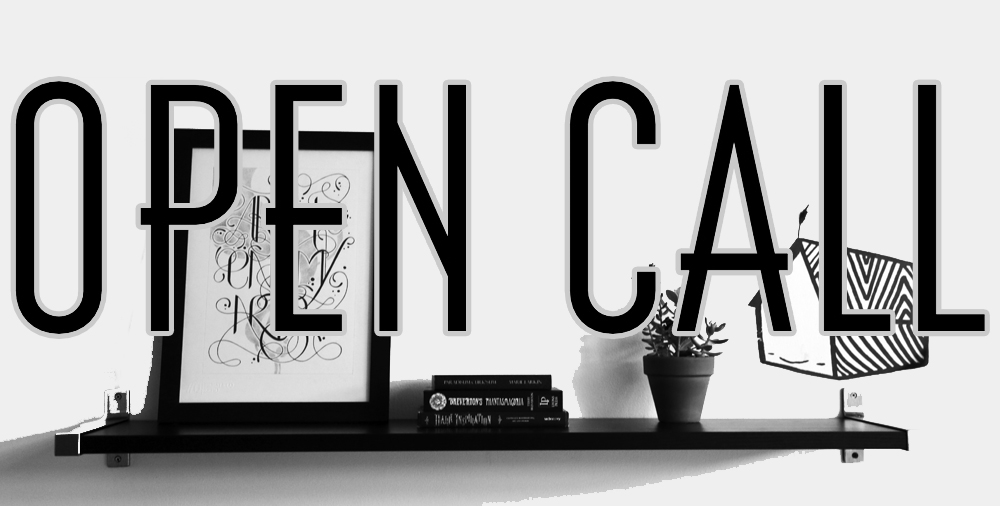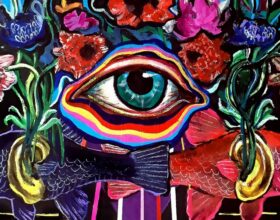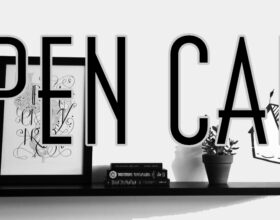Welcome to the 6th edition of Open Call! Today we are talking about relevancy. If you are an artist without followers, do you even exist at all?
What is real?
Time is a flat circle.
Email us at [email protected] with any questions you have, concerns, success stories, challenges, or any other topic you’d like to discuss with a Gallery Director. Every other Monday we’ll publish a few of our favorites along with my replies. If you don’t see your email published, it does not necessarily mean it won’t be saved for a future installment. There have already been way too many good questions to make it into just one edition.
Visit my online author profile and stay updated on past editions. Some emails have been lightly edited for length.
Hi Patrick,
Here’s something that’s been on my mind since I started seriously exhibiting work: I don’t have a strong social media presence and I’m curious, from a gallery’s perspective, just how a lack of online presence looks. (And I’m not speaking to professional websites here, but facebook, instagram etc) Promoting oneself as a brand and saturating platforms with images of work seems to be the norm, and I think that’s great (whatever works, ya know), but it really doesn’t feel natural to my process or personality or the vibe of my work. I’d rather be creating/growing/learning in the studio, and engaging in valuable discussion with others of the art world, or “consuming” others’ content-rich commentary.
At the same time, I wouldn’t want the lack of a social media “brand” to somehow devalue the work, especially if people equate the number of followers and “likes” to the quality of the work itself. Which may also be the norm! What are your thoughts as it might pertain to emerging artists who have yet to gain traction in their niche? Would you say this lack of personal branding is a turn-off for new artists approaching open calls and galleries for representation? Or do images speak for themselves in your mind? It would certainly be interesting to hear an answer from someone already on the inside!
Thanks!
-Jackie
Hi Jackie,
There are many very good reasons why an artist would want to grow and maintain a social media presence, but there’s no rule that says you have to participate. If you’re against it or believe that participating will say something negative about you or your work – and I don’t believe this is a reasonable concern – opt out. We belong to part of the art world that is growing in volume and influence very rapidly, and I think it would be naive to deny that embracing or at least taking advantage of social media has been an important part of that.
To be fair, unless you are a person who is young enough to have grown up with social media, I don’t know if it ever feels completely natural. Personally, I think there are some things about social media that are absolutely great and other things about it that are just awful. I’m sure a lot of people feel the same. Maybe most, I don’t know. But having mixed feelings shouldn’t necessarily keep you from using what can be a very useful and effective tool, or allowing yourself access to all the people who rely on social media to communicate or as a resource to find and share information.
One thing that you said and I would strongly disagree with is that there’s a direct relationship between online engagement and quality of work. I think that’s bullshit. Not just art but generally you can always find plenty of examples of some really great things which have been overlooked online and some very bad things that are wildly popular. If you make great art that speaks to and resonates with people, it’ll make your job easier online, but more often than not success on social media depends on a different and complimentary skill set than being a good artist.
I think Instagram as it exists right now is great for visual artists. Obviously it’s designed for visual content, it’s simple, it’s direct, your content doesn’t get hidden or lost in some algorithm intended to target content. I don’t know why an artist wouldn’t at least be present.
Recently I read a really great interview with Ian MacKaye and in it he talked about some of these things and said, “Relevancy, or irrelevancy, isn’t a concern for the participants. The people who are actually the doers don’t do it for relevancy”. I think social media can be an incredible tool for an artist and one that you shouldn’t be too quick to dismiss entirely, but whatever you decide to do, that is probably a healthy place to start.
-patrick
Hey Patrick,
I would like to hear your opinion about the struggle I’m going through right now.
I’m a self-taught artist and I really want to work as an artist. I want to take commissions, which will challenge me. But the problem is, where I live, there are very few galleries where I can display and promote my art. Some galleries are too ancient and others are too contemporary for my art. The same with art studios. As for the international galleries, I look for group shows where I can exhibit my works along with other artists but don’t come across any. Any suggestions on how to start a career as an artist?
Best,
Sara
Hi Sara,
I’m sorry you are struggling. However, I find it pretty hard to believe that you’ve looked around on an international level and still there are no shows for you. What are you doing other than looking? Are you contacting these galleries and making an effort to be a part of these shows?
When you are looking around for these opportunities, be careful that you are not letting your own opinion of yourself and your work be the one and only thing making these determinations. There’s always struggle when you are getting started, but in my experience artists who have decided on their own that the work they make doesn’t ‘fit in anywhere’ tend to have created a self-fulfilling prophecy for themselves. It’s similar to when you hear an artist declare that the only reason they have not found the success they deserve is because their work is ‘too provocative’, or too edgy and everyone is just too prude to accept it. While there are certainly additional challenges and hurdles that come with making work that lacks or actively retaliates against any notion of mass or conventional appeal, I think there’s usually more to it.
Be proactive. The world has a way of tossing out all sorts of obstacles so make sure you aren’t making even more of your own. Don’t be afraid to step out of your area or comfort zone to find what it is you think you need. I always think that building a base locally is smart and important, but if you really believe that there isn’t a fit for you where you live, look elsewhere. Or, build your own place. Just don’t wait.
Good luck!
-patrick
Hi Patrick,
I am a new artist. I’ve been in the graphic arts industry for 15 years and now I am moving in the direction of painting.
I am having my own exhibit on November 12th, Little Italy NYC. I would like to know, how can someone like me, that is fairly new to the industry can get noticed. Or can get a gallery to become interested in my work? And how does it help the artist?
Thanks,
Claudia
Hi Claudia,
Without knowing very much about your plan, just by being proactive, moving in the direction you want to go in, and planning your own show, I would say you are probably on the right track.
There are different things that galleries are looking for. If you are a self-starter, have a plan, and be sort of loud about that – I don’t mean be obnoxious or spamming people (semi-regular reminder that commenting ‘check out my art’ on someone else’s IG post is never a great idea) – I mean more finding ways to effectively broadcast your work and accomplishments, they’ll notice. Approach galleries you like, go to other shows, meet people. I always suggest before you pitch yourself to first have a conversation about what that person likes or is looking for.
Galleries can help in many ways. Obviously they can assist you with the retail side of what you do, but many galleries can also help with press, promotion, marketing, publishing. If you are interested in doing some commercial work, or merchandising, they can sometimes help with that. They can also simply offer another POV or have a more general advisory role in your career if you trust them to do that for you. Not all galleries are going to do all of this maybe some of them won’t do most of it so it’s important to know what you need and make that a part of the conversation.
For me one thing that is always a turn off is when someone’s plan is to wait idly until they are noticed. I don’t think this is a plan that ever works well.
Keep doing what you are doing and people will notice. It’ll happen.
-patrick
Have a question for Patrick? Send inquiries to [email protected]
Patrick Shillenn is the co-founder and director of Arch Enemy Arts in Philadelphia. He doesn’t think he has all the answers. He just wants to have the conversation.
Follow him on IG @pshillenn & Twitter @mathclub





